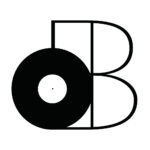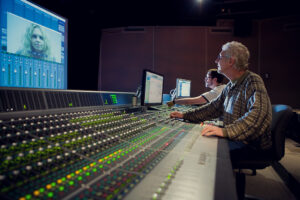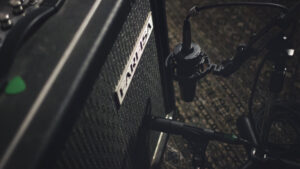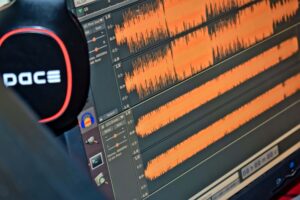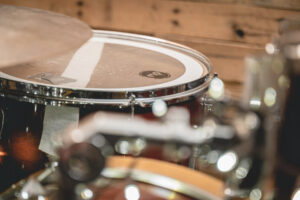I’m always hearing Random Access Memory (RAM, not the Daft Punk album) being discussed amongst music producers in the process of purchasing a new computer (especially one that can’t be upgraded). It’s a difficult question to answer if we don’t understand what RAM does. So, how much RAM do you need for music production and should you buy more “just in case”?
How much RAM do you need for music production anyway? Most people say that 8 GB is plenty while others insist that 16 GB is the way to go. What about 32 GB? Instead of simply telling you what you need (because I don’t know anything about your setup), we’ll be learning how to make the decision on our own. We’ll be finding out why RAM is essential for music production and the factors that’ll determine how much you’ll need. Lastly, we’ll also be looking at the elements that contribute to your RAM’s performance.
- How much RAM do music producers really need?
- Music producers need DDR4 RAM and nothing less
- Music producers need RAM with the highest clock speed
- The best/most affordable RAM for Mac-users
- The best/most affordable RAM for PC-users
- How much RAM do I use and why?
How much RAM do music producers really need?
The answer to that question depends on the type of music producer that you are. More specifically, it depends on the amount of sample libraries you work with. Of course, it’s not the only thing that takes up RAM, but it’s certainly the most significant.
However, the performance of RAM is dependent on the efficiency of the CPU.
To make things simpler to understand though, we’ll simply be assuming that we’ve got the perfect synergy between RAM and CPU. How much RAM do you need for music production if performance isn’t the issue?
To be honest, 8 GB is probably more than enough for 97% of us.
I personally use 8 GB at the moment AND I work with sample libraries.
If we take Steven Slate Drums for example, the average kit takes approximately 1 GB. That’s really not that much and it’s the cymbals that take up most of the memory. However, drum sample libraries aren’t the only tools I work with.
I also use EastWest’s Composer Cloud in most of my projects.
Depending on the amount of software instruments you’ve got, it can add up pretty quickly. Most of these sample libraries (Omnisphere, Kontakt, etc…) also take more RAM since they’re recorded in high-resolution.
However, I’ve haven’t experienced my 2018 Mac Mini’s limits yet and I’m usually pretty liberal with the software instrument tracks. Although software instruments like Arturia V Collection 7 rely less on RAM since they’re not sample-based (emulation is more CPU heavy).
So, who would need 16 GB of RAM (or even 32 GB)?
We’re talking about music producers who layer sample libraries and who probably don’t work with audio tracks at all. In other words, film composers.
Having an entire orchestra with different articulations and with multiple libraries can easily add up to 16 GB or even 32 GB.
If you feel like that’s the route you’ll be taking, I think you’ll be safer with 32 GB personally.
BUT, we still haven’t talked about the other elements of RAM.
Music producers need DDR4 RAM and nothing less
As of now, the most advanced RAM we have access to is DDR4. It’s responsible for the performance/speed of the memory and should not be something you compromise on.
If you’re relatively up to date, your computer most likely already has DDR4 and your motherboard most likely supports it.
It’s also difficult to find DDR3 RAM anyway.
If you’re building a new machine, you’ll also want to make sure that the motherboard, CPU and RAM are all compatible with one another. In other words, they should be from more or less the same generation for optimal performance and synergy.
If you’re purchasing pre-built computers (like Apple), you’ll need to make sure that the RAM included is in fact DDR4 (especially if you’re looking at used computers).
DDR5 is set to be released in 2021, so there isn’t really an option to “future-proof” your build.
To be honest though, I believe that DDR4 is more than good enough. I think it’ll still be relevant in say, 5 years from now? I’m just saying not to compromise today, but RAM’s speed isn’t usually the issue.
We usually run into problems when we run out of memory!
However, just because it’s DDR4… It doesn’t mean it’s the fastest model on the market.
Music producers need RAM with the highest clock speed
Just like processors, RAM’s speed is also measured in MHz/GHz. When looking at DDR4, the speeds usually range from 2,133 MHz ro 3,200 MHz.
However, the real question is… Is this just another marketing scheme?
The answer lies somewhere in the middle. Having the highest possible clock speed for your RAM can potentially result in unstable performance. The CPU’s clock speed affects performance much more either way, so it’s not worth it.
I think anything around 2,400 MHz would be more than enough!
If you ever feel like your system is slowing down and you haven’t reached your RAM’s limit, it can most likely be improved by upgrading your CPU.
It can really bring some life back into your recording system.
Other than that though, I don’t think music producers need to dive any deeper than this.
Just make sure you’ve got DDR4 RAM with at least 2,400 MHz of speed and you’re set! It’s your CPU that does most of the work anyway, so just set yourself up with enough RAM and that’s it.
We’ll be moving onto my recommendations now.
The best/most affordable RAM for Mac-users
If you own an Apple computer, you know that upgrading RAM isn’t always easy/possible. However, if your particular model could handle it, you’ll need the right kind.
The company known as Crucial has lots of options available!
As much as I’d like to recommend one specific model though, you’ll need to know the model of your computer for the best match. It’s really easy to work with Crucial since they make it a priority to tell you which model it’s been tested for.
In other words, it’s very important to use “Mac Memory” and not just conventional RAM.
It’s important because conventional RAM won’t fit into the socket (especially not if you’re doing an “illegal” modification).
There are many size formats which are available, so that isn’t the issue. Just make sure to follow the teachings I shared in the previous sections and you’ll be fine. If you’re looking for your model number, you can click the Apple Logo on the top left and select “About This Mac”.
The best/most affordable RAM for PC-users
If you’re working with PC (especially one that you’ve built), I’ve never had any problems with Corsair RAM. It’s what I used to put into my builds before switching over to Apple.
If you’re working with a pre-built Windows-machine, it might be just as difficult as upgrading the RAM on Apple computers.
At that point, you’d be better off looking into “Laptop Memory”.
However, I definitely have some recommendations for those of you in the market. I personally prefer to work with a pair at most, so you can either go with one of each or more.
The Corsair Vengeance RGB Pro 2x 8 GB would be my choice for the time being.
If you need more RAM, I simply recommend the RGB Pro 2x 16 GB
These days, RAM comes in pairs so you’re better off just going with one or the other. It’s also more affordable than buying them individually (if that’s even possible) and you’ll be sure to have more than enough RAM!
How much RAM do I use for music and why?
I’m personally working with my 2018 Mac Mini at the moment, so I’ve only got 8 GB of RAM. I went with the entry-level model because it had more than enough performance for my needs.
I haven’t run into any issues with 8 GB even when using multiple instances of sample libraries in my larger projects.
And besides, even if this particular model can’t be “upgraded”, it’s still possible to change the RAM. I just told myself I’d deal with the situation once I got there, but it hasn’t gotten to that point yet, so 8 GB is plenty!
However, since you’ll be saving yourself some money by building your own PC, you’ve got nothing to lose by getting a pair of 8 GB DDR4 RAM.
Just keep in mind that the CPU you’re using will impact the performance of the RAM much more than the speed of the RAM itself.
On that note, I’ll be leaving you with a shopping list that includes the products we covered today. I also encourage you to do your own research. If need help finding the right “Mac Memory”, you can always post your question the comments!
Crucial 16 GB Kit for Mac (find the one for your model, just an example)
Corsair Vengeance RGB PRO 2×8 GB
Corsair Vengeance RGB PRO 2×16 GB
So, I hope this answers the question “how much RAM do you need for music production” once and for all. It should be pretty clear what type of music producer you are and the next logical step would be to purchase RAM according to your needs. If you need to purchase a whole new computer, that’s an entirely different topic and I recommend you read my ebook for that. You’ll also be subscribed to my weekly newsletter where you’ll receive high-quality content like this in your inbox. Thanks for reading, I appreciate your time and dedication!
Sources:
https://www.optoproductions.com/en/how-much-ram-for-music-production/
